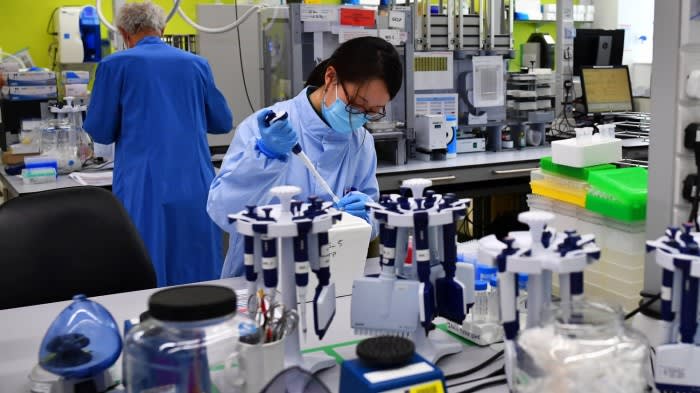Bigger capital flows, improved infrastructure and deeper international collaboration will be needed for the next government to tap innovation and drive economic growth, UK science and technology leaders have warned.
Institutional heads and entrepreneurs have urged greater clarity on how a future government plans to harness the country’s scientific prowess to develop internationally competitive companies and industries.
The calls highlight concerns that successive administrations have failed to capitalise on the potential of UK innovations, in areas such as life sciences and quantum computing, and build thriving sectors that spawn job opportunities in related industries.
Bobby Gaspar, co-founder and chief executive of gene therapy company Orchard Therapeutics, told the Financial Times neither of the two main political parties had so far shown they would do what was necessary to fully exploit the opportunity.
“There have been high level sound bites around life sciences but no real concerted action by the Conservatives. Labour talks about growth with very little detail on how or in what industries that growth will be achieved,” he added.
The Conservative government promised to make Britain a “global science and technology superpower” by 2030, but the sector has been affected by the fallout from hardline immigration policies and universities being dragged into so-called “culture wars”.
Ambitious expansion plans, such as the “Cambridge 2040” project to build a new science quarter in the UK’s top-ranked university, have also been hit by infrastructure shortages, including a lack of water availability, transport links and grid connections after decades of under-investment.

Michelle Donelan, science secretary, has denounced the “slow creep of wokeism” in universities and other public bodies. This year she had to retract allegations that a researcher backed or sympathised with the Hamas militant group.
Labour has heralded the potential of life sciences in its manifesto and proposed measures aimed at boosting invention at universities and in companies.
The measures include unlocking more private investment, creating a Regulatory Innovation Office, to improve the speed at which regulators bring innovations to market, and better tapping National Health Service patient data for genomic research.
But while the main parties’ commitment to innovation was “really positive”, more needed to be done to free up the required finance, expertise and research facilities, said Mairi Gibbs, chief executive of Oxford University Innovation.
“People, money and space are the three things that get in my way,” Gibbs said.

Gibbs urged the next government to build on the findings of an independent review of university spinout companies published in November and the “Mansion House” reforms announced last year to increase pension fund flows to innovation.
She also pointed to the blueprint provided by a guide drawn up by universities and investors last year to promote the development of spinouts, which are private companies developed from academic research institutions.
The next government will need to use science-focused investment as a tool to build up the economy more widely, said Dan Thorp, the chief executive of Cambridge Ahead, a development lobby group that includes the chip designer Arm and the Wellcome Sanger Institute, the UK’s largest genomic sequencing centre.
For too many tech companies, he added, if they were not headquartered in Cambridge then their next choice was Boston, Palo Alto or Paris — not an alternative destination in the UK.
“We need to move away from the zero-sum game of ‘levelling up’ and scale innovation across the economy and the city regions. The key is seeing this not as a horse race between regions, but knowledge-intensiveness across regions,” he said.
Science and technology figures are also concerned that neither party has promised to cut the upfront costs of visas, with a five-year global talent visa for the UK now costing £20,980, which is “multiple times” the cost in competitor countries, according to Wellcome, the biomedical charity.
The growing funding crisis in universities is a further worry, particularly its impact on institutions outside of a group including Imperial College London, Oxford, Cambridge and UCL that are close to the top of international rankings.
The UK needs to develop collective endeavour between research, business, government and the media to promote emerging science and technology industries, said Ed Bussey, chief executive of Oxford Science Enterprises, the university’s independent investment company.
“We are building some of the most incredible companies in the world in quantum computing, life sciences, health tech and fusion right now, but these are 10- to 15-year projects,” he said.
“It’s true the government doesn’t have a great appetite for ‘picking winners’ but in some areas, like quantum, we know which are likely to be the breakout companies and we need to collectively get behind them.”



